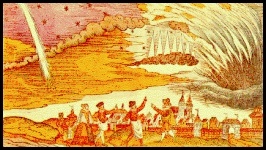
 Danger in the Sky! For as long as there have been people on Earth, many legends, myths and superstitions have centered around the Northern Lights ("aurora borealis"). It is thought that the early dragon legends of China and Europe originated from the aurora, as people imagined firey breath flashing across the sky. In ancient times, when the waves of light could occasionally be seen flashing through the sky as far south as France and Italy, they struck fear into the population. Auroras rarely appeared that far south, and people were shaken by the sight, believing the lights to be a warning of illness, plague and death. When the aurora were red, the most common color at low latitudes, the fearful and superstitious people of Middle-Age Europe thought they were being warned of the outbreak of war. A less fearful belief was that the Northern Lights were the breath of heavenly warriors as they fought in the heavens. As a kind of posthumous reward, the spirits of soldiers that gave their lives were allowed to battle on in the skies forever.
Click pictures for more information and credits. Library: Northern Lights Sky/Seasons, Arctic Links: Northern Lights, Arctic Northern Lights Slide Show Arctic Maps & Weather Reports |

|
DICTIONARY: Just "double-click" any unlinked word on this page for the definition from Merriam-Webster's Student Electronic Dictionary at Word Central. |

|
ARCTIC LIBRARY & GLOSSARY: Check this section for an index of the rest of the things you really need to know about the Arctic. |

|
ARCTIC MAPS & WEATHER REPORTS: Maps of the Northwest Passage, explorers' routes, iceberg sources, Nunavut, the Arctic by treeline, temperature... |

|
ARCTIC LINKS: Even more information! Links to sites related to the Arctic and "Iceberg: the Story of the Throps and the Squallhoots". |

|
GUIDE TO ARCTIC SUNRISE & SUNSET: How much sunlight or darkness is there in the Arctic on each day of the year? |
|
Search for more on this topic...from Athropolis! Select the search engine (up to 4 at one time), enter your request, and click "Search". ( Search Tips ) |
to is the property of their respective owners, and Athropolis is not responsible for their content.